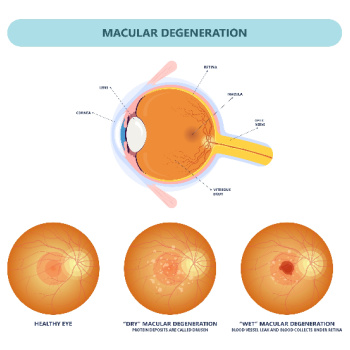The macula is the central area of vision. When you look directly at an object, you are aligning your macula to see it clearly. We use this for seeing details when reading, driving, recognizing faces, and computer work. The rest of the retina provides us with peripheral vision, so we are aware of our surroundings.
Macular degeneration is often referred to as age-related macular degeneration (AMD), because it primarily affects older adults. It is a leading cause of vision loss in people over the age of 50.
There are two main types of macular degeneration:
Dry AMD (Non-Neovascular AMD): This accounts for about 80-90% of cases. It occurs when the macula thins and breaks down over time, leading to a gradual loss of central vision. Dry AMD typically progresses slowly, and there may be no noticeable symptoms in the early stages.
Wet AMD (Neovascular AMD): this is more severe and accounts for the majority of severe vision loss associated with AMD. It occurs when abnormal blood vessels grow beneath the macula and leak blood and fluid, causing rapid and severe central vision loss. Wet AMD can develop suddenly.
Some of the risk factors for macular degeneration include:
Age: AMD is most common in people over the age of 50.
Family history: A family history of AMD increases the risk.
Smoking: Smoking is a significant risk factor for AMD.
Race: Caucasians are at a higher risk than other racial groups.
Genetics: Specific genes have been linked to an increased risk of AMD.
Currently, there is no cure for macular degeneration, but there are treatments available that can help slow the progression of the disease and manage its effects, especially in the case of wet AMD. Some common treatments include:
Anti-VEGF Injections: These medications are injected into the eye to inhibit the growth of abnormal blood vessels in wet AMD.
Photodynamic Therapy (PDT): PDT uses a light-sensitive drug and laser therapy to target abnormal blood vessels in wet AMD.
Low Vision Aids: Magnifying glasses and computer screen readers can help people with AMD make the most of their remaining vision.
Lifestyle Modifications: Adopting a healthy lifestyle, including a diet rich in antioxidants and omega-3 fatty acids, stopping smoking, and protecting your eyes from harmful UV light, can reduce the risk of developing AMD and help manage its progression.

